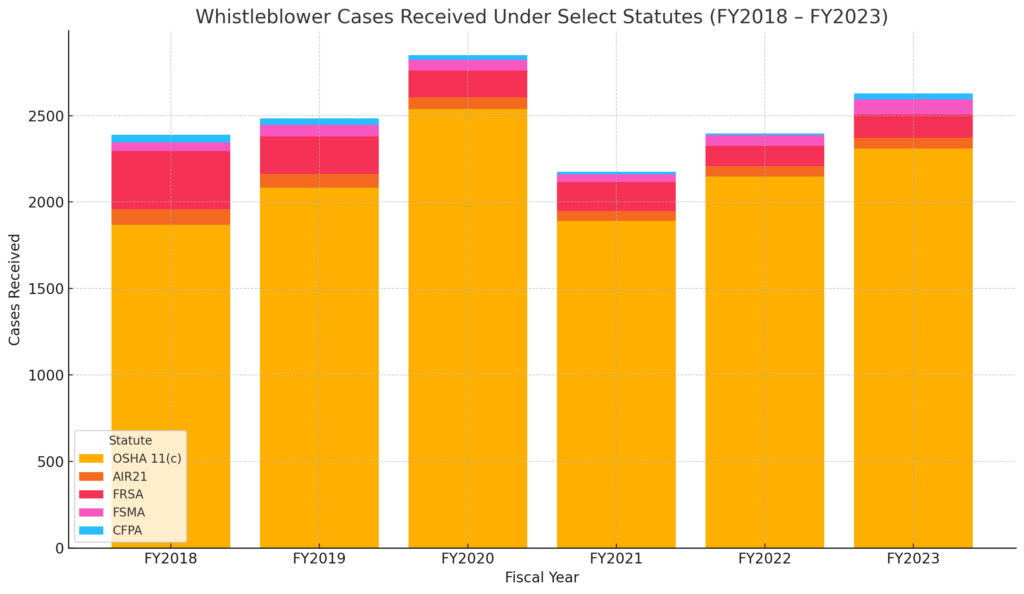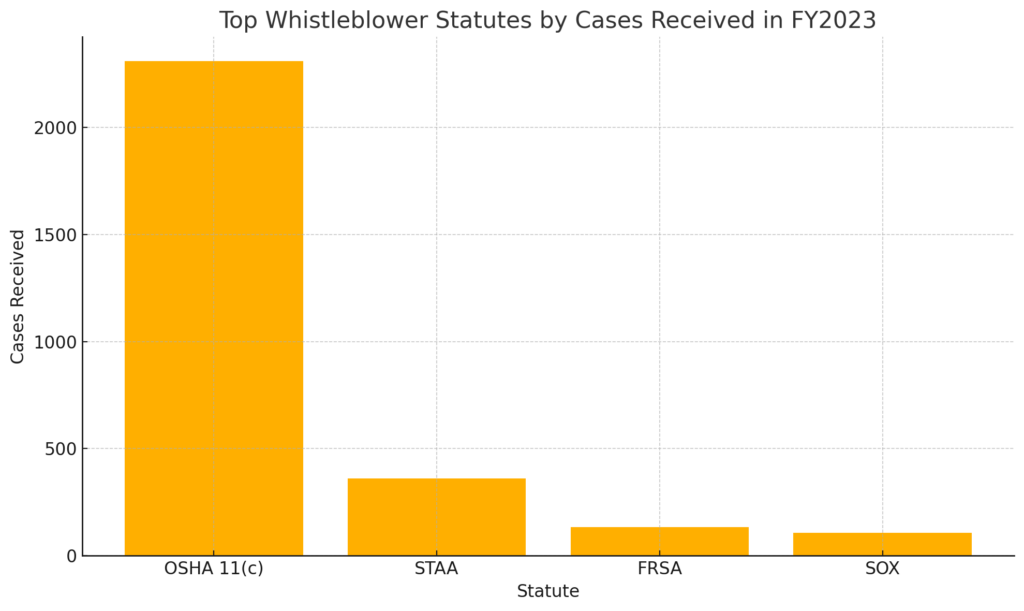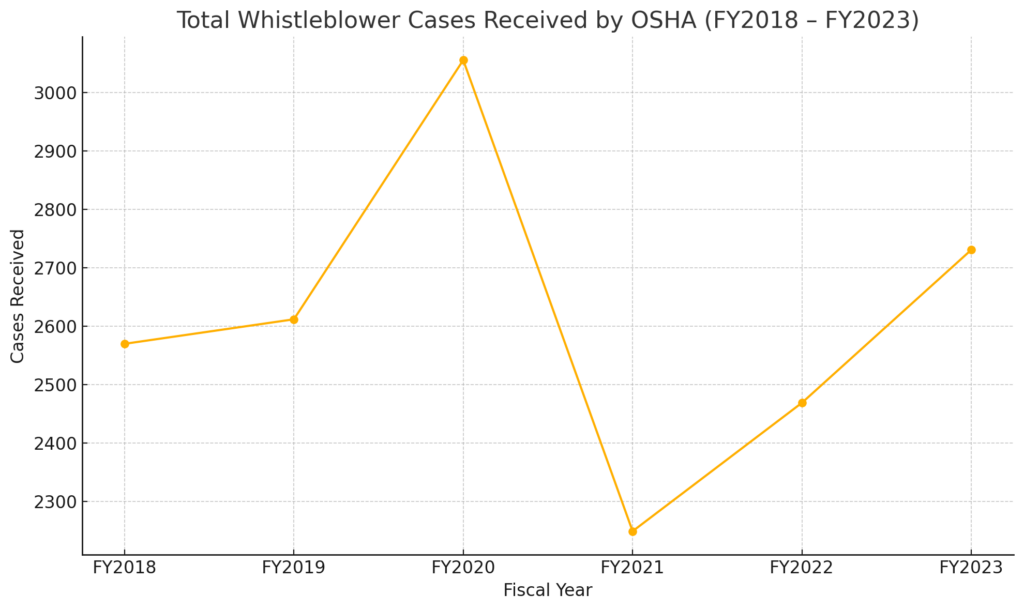Washington DC Whistleblower Attorney

Experienced Whistleblower Attorneys
Our Washington DC whistleblower attorney has helped many people just like you work through very difficult workplace-related issues. Many people come to us with questions about whistleblower laws and other business matters. If you have questions about the rights of whistleblowers, or need legal representation for upcoming litigation, call the Federal Practice Group today.
Table of Contents
- Experienced Whistleblower Attorneys
- How Our Whistleblower Attorney Can Help You
- Examples of Discrimination
- Washington DC Whistleblower Statistics
- Washington DC Whistleblower FAQs
- Washington DC Whistleblower Attorney Glossary
- Federal Practice Group, Washington DC Whistleblower Attorney
- Contact Our Washington DC Whistleblower Attorney Today
Unlawful Retaliation
It is unlawful for employers to take adverse actions against employees because they have acted in whistleblowing or participated in another activity protected under employment law. There are various types of activity that is protected by law, including the following:
- Refusing to engage in unlawful conduct
- Reporting fraud or illegal conduct
- Reporting issues of safety
- Reporting harassment or discrimination at work
- Complaining about unlawful pay scale practices
- Disclosing your wages amount
- Disclosing details about working conditions
- Engaging in activity of a political nature outside the workplace
- Refusing to sign non compete agreements
- Resisting the advances of a colleague or superior
- Participating in workplace investigations
Examples of Whistleblowing
A few of the most common types of whistleblower cases involve workers reporting corruption, racial discrimination, sexual harassment, or fraud. Corruption encompasses a range of illegal conduct. Bribery is one of the most well-known examples, but corruption also covers kickbacks, fraud, and embezzlement.
As your Attorney for DC Whistleblower Retaliation can explain, if two employees and very similar situations are not treated equally because of one’s color, race, ethnic origin, descent, or immigration status, this is considered a racial discrimination.
There are laws in place that are supposed to protect employees from unwanted sexual advances and remarks, however, all too often policies go unenforced and incidents are unreported.
Fraud is any criminal or wrongful deception that is undertaken to obtain personal or financial benefits. Fraud may occur in almost any kind of company, educational facility, or government entity. The most common instances of fraud are overbilling or under billing, price-fixing, false certifications, and concealing safety concerns.
Employer Retaliation
An employer may try to punish or undermine a worker who has reported illegal or ethical misconduct at the company. Retaliatory actions can be more subtle or underlying, to obvious and outright persecution. Examples of retaliation include cutting hours, reducing pay, transferring to a new position that is essentially a demotion, terminating her employment, blacklisting, and creating a hostile environment.
It is worth mentioning that any action taken on behalf of an employer that negatively affects an employee’s status or work environment may be considered workplace retaliation. Due to the potentially long-term effects of this type of action, those who believe they are victims or witness it happen to someone else must not stay silent.
How Our Whistleblower Attorney Can Help You
You have a much better chance of achieving the case results that you deserve if you hire a lawyer who has been able to assist clients with their whistleblower cases. It can be easy to make mistakes when you are trying to figure out what steps to take and when you are trying to protect your identity and report criminal activity, you need to understand the entire process. Not having enough knowledge about what steps to take when you are a whistleblower can result in critical mistakes that can negatively impact you. When you decide to turn to a DC whistleblower retaliation attorney, you can receive the legal counsel that you need to navigate your situation safely, and without fear of retaliation and consequences.
Another key reason that you should hire a whistleblower lawyer is because many government employers have their own powerful team of attorneys that have experience combatting claims. You will want to hire a lawyer who is just as competent as the ones representing your employer. If you need more information about what resources that a lawyer who is familiar with many whistleblower cases can provide for you, set up a consultation that is risk-free and confidential immediately.
Understanding Whistleblower Protection Laws
Our Washington DC whistleblower attorneys understand that the act of whistleblowing is not without its risks. The law, however, provides a shield in the form of whistleblower protection laws. These laws are designed to protect employees who, in good faith, report illegal activities or misconduct in their workplace.
Whistleblower protection laws typically stipulate that an employer cannot retaliate against an employee who discloses information about fraudulent or illegal activities. This could be reporting violations of laws, rules, or regulations, or a danger to public health and safety.
As a DC whistleblower retaliation attorney will tell you, retaliation can take several forms, including firing or laying off, blacklisting, demoting, denying overtime or promotion, disciplining, denial of benefits, failure to hire or rehire, intimidation, making threats, reassignment affecting prospects for promotion, or reducing pay with these forms of retaliation, it is critical that you seek guidance from a seasoned DC whistleblower retaliation attorney. One of the teams that stands out in the fight for whistleblowers’ rights is the Federal Practice Group. With their extensive experience and dedicated service, they will ensure your rights are upheld and that you’re adequately protected throughout the process.
Understanding the Rights of Whistleblowers
A Washington DC whistleblower attorney from our firm will help you understand your rights as a whistleblower. You have a legal right to report any misconduct or illegal activities you witness at work. Your employer should not retaliate against you for coming forward.
Unfortunately, retaliation against whistleblowers does occur. Employers sometimes attempt to intimidate whistleblowers by threatening their job security, slashing their wages, or creating a hostile work environment. A DC whistleblower retaliation attorney, such as those found at the Federal Practice Group, can help you navigate these challenges.
Whistleblower protections don’t just apply to federal employees. State and local laws often extend similar protections to employees in the private sector. Regardless of your employment setting, if you have been retaliated against for whistleblowing, it’s crucial to consult with a qualified Washington DC whistleblower attorney as soon as possible.
Examples of Discrimination
As a federal employee discrimination attorney knows, this form of discriminatory treatment is a serious issue that has plagued the US government for decades. Discrimination in the workplace is defined as treating someone unfavorably because of their race, color, religion, sex, national origin, age, disability, or genetic information. Federal employees, who are supposed to uphold and enforce the law, are not immune to discrimination. There are several examples of discrimination that federal employees regularly experience.
- Gender Discrimination
Female federal employees have been subjected to discrimination for decades. In 2019, a female administrative judge filed a complaint alleging that she was passed over for promotion because of her gender. She claimed that a male colleague with less experience and qualifications was promoted over her. When workers are not paid equally compared to other workers of different genders, it may also qualify as gender discrimination.
- Racial Discrimination
Racial discrimination is one of the most common forms of discrimination in the federal workplace. In 2019, the Equal Employment Opportunity Commission (EEOC) reported that African American employees were more likely to experience discrimination than any other racial group. When racial slurs or other offensive or derogatory comments are used against workers of a specific race, it may be a credible racial discrimination case.
- Age Discrimination
Age discrimination is another form of discrimination that federal employees may experience. In 2017, the EEOC settled a case in which a federal agency was accused of discriminating against older employees. The agency allegedly targeted older employees for layoffs and replaced them with younger, less experienced workers. Examples of age discrimination include inadequate training and lack of accommodations for elderly workers.
- Disability Discrimination
Federal employees with disabilities are also at risk of experiencing discrimination. In 2020, a blind employee of the Department of Homeland Security filed a lawsuit alleging that the agency failed to provide him with reasonable accommodations. For example, an employee may argue that they were not given access to the software they need to be able to perform their job duties properly. Disability discrimination can also come in the form of being denied a promotion or being subjected to derogatory comments.
- Religious Discrimination
Discrimination that is based on religious beliefs is another common form that many employees experience. In 2020, a Muslim employee of the Federal Aviation Administration filed a complaint alleging that she was harassed and discriminated against because of her religion. The employee claimed that her supervisor made derogatory comments about Muslims and refused to grant her leave to observe religious holidays. Religious discrimination can also come in the form of being passed over for promotion or being denied training opportunities.
- Sexual Orientation Discrimination
Individuals in the LGBTQ+ community are also vulnerable to discrimination in the workplace. In 2019, a federal employee filed a complaint alleging that he was harassed and discriminated against because of his sexual orientation. The employee claimed that his supervisor made derogatory comments about gay people and created a hostile work environment. As a trained federal employee discrimination attorney like one from Federal Practice Group can explain, sexual orientation discrimination can also come in the form of being denied a promotion or being subjected to derogatory comments.
Washington DC Whistleblower Statistics
In Fiscal Year (FY) 2023, the Occupational Safety and Health Administration (OSHA) received a total of 3,243 whistleblower complaints across various statutes, marking a 15% increase from FY2022’s 2,815 complaints.
The majority of these complaints were filed under Section 11(c) of the Occupational Safety and Health Act (OSHA 11c), with 2,309 cases, representing approximately 71% of the total complaints received.
Other notable statutes under which complaints were filed include:
-
Surface Transportation Assistance Act (STAA): 361 complaints (11% of total)
-
Federal Railroad Safety Act (FRSA): 134 complaints (4% of total)
-
Food Safety Modernization Act (FSMA): 86 complaints (3% of total)
-
Sarbanes-Oxley Act (SOX): 106 complaints (3% of total)
OSHA also completed investigations into 3,649 whistleblower complaints during FY2023. Of these, 23 cases (0.6%) resulted in merit findings, where OSHA found reasonable cause to believe that a violation occurred. Additionally, 509 cases (14%) were settled, and 2,154 cases (59%) were dismissed.
These statistics underscore the critical role of whistleblower protections in safeguarding employees who report violations. The data highlights the importance of legal representation for whistleblowers to navigate the complexities of filing complaints and seeking justice. As the number of complaints continues to rise, the assistance of whistleblower attorneys becomes increasingly vital in ensuring that employees’ rights are upheld and that they are protected from retaliation. If you require assistance with your whistleblower case, contact our experienced DC whistleblower attorney today.



Washington DC Whistleblower FAQs
Whistleblower protections can be critical for those who report misconduct or unlawful activity within government agencies or contractors. People often have questions about how these laws work, what to expect during the legal process, and whether their identity and rights will be safeguarded. Below, we’ve answered some of the most common questions people ask when they’re thinking about contacting a Washington DC whistleblower attorney.
What Protections Does the D.C. Whistleblower Protection Act Offer to Employees of Government Agencies or Contractors?
This law shields District government employees from retaliation when they report violations of laws, rules, or regulations. It also covers disclosures of gross mismanagement, waste of public funds, or abuse of authority. Employees working for contractors with the District may also be protected, depending on the terms of their employment and the nature of the report. These protections can apply whether the disclosure is made internally or to an external agency, as long as it’s made in good faith. By speaking to a dedicated whistleblower attorney, you can determine if you are protected.
How Long Does a Whistleblower Case Typically Last?
The length of a case varies depending on several factors, including the agency involved, the nature of the complaint, and how the employer responds. Some cases are resolved in a matter of months, while others may take a few years, especially if they involve litigation or appeals. When we work with clients on whistleblower matters, we aim to provide clear timelines and consistent updates throughout the process. We will work hard to help you resolve your case in a timely but also effective manner.
Are Whistleblowers Protected from Retaliation by Employers?
Yes. Federal and District laws prohibit employers from retaliating against employees who report misconduct. Retaliation can include termination, demotion, reduced pay, exclusion from projects, or other adverse actions. Our Washington DC whistleblower attorney can help determine whether the actions taken by an employer meet the legal standard for retaliation and what legal remedies may be available. In many cases, employees can seek reinstatement, back pay, and other damages.
Can I Keep My Identity Confidential When Reporting Wrongdoing?
In some cases, yes. Certain whistleblower programs allow individuals to file complaints anonymously or keep their identities confidential during an investigation. However, there may be points in the process where anonymity cannot be guaranteed, particularly if legal action is required or the report leads to a public proceeding. If you have concerns about protecting your identity, contact our attorney today. We help clients weigh their options and decide the best way to report misconduct while protecting their privacy as much as possible.
What Steps Should I Take if I Experience Retaliation After Blowing the Whistle?
The first step is to document the retaliation. Keep records of emails, performance reviews, changes in job duties, or any negative actions that occurred after the report. Then, contact a law firm that handles whistleblower claims. Acting quickly is important because strict deadlines may apply. At Federal Practice Group, we work with individuals in these situations to assess their rights and determine what claims they can bring under local or federal law.
If you believe you’ve experienced retaliation or are considering reporting misconduct, talking to a Washington DC whistleblower attorney can help you move forward with confidence. We’re here to answer your questions, protect your rights, and support you through each step. Contact us today to schedule a consultation.

Washington DC Whistleblower Glossary
If you are a whistleblower in Washington DC who has experienced retaliation for reporting workplace misconduct, illegal activity, or other violations, you may feel overwhelmed and uncertain about your legal rights. At the Federal Practice Group, we are committed to protecting whistleblowers and holding employers accountable for unlawful retaliation.
Employer Retaliation Defined
Employer retaliation occurs when an employer takes adverse action against an employee who has engaged in a protected activity, such as reporting fraud, discrimination, safety violations, or other illegal conduct. These actions can include termination, demotion, pay cuts, blacklisting, or creating a hostile work environment. Even subtle retaliatory behaviors, such as exclusion from meetings or limiting advancement opportunities, may qualify as retaliation.
We have helped clients who faced retaliation after exposing financial fraud or safety concerns.
Protected Whistleblower Activities
Federal and state laws safeguard employees who report illegal or unethical conduct from retaliation. Activities protected under these laws include:
-
Reporting fraud, embezzlement, or mismanagement of funds.
-
Disclosing safety violations that endanger employees or the public.
-
Filing complaints about harassment or discrimination.
-
Refusing to engage in unlawful practices or violations of public policy.
For example, an employee who raises concerns about discrimination in hiring practices or reports unsafe working conditions is protected from employer retaliation. We work closely with clients to document their actions and the employer’s response, building strong cases for their protection and recourse.
Whistleblower Protection Laws
Several laws at both the federal and state levels protect whistleblowers from retaliation. These include the Whistleblower Protection Act, which covers federal employees, and state-level statutes that extend similar protections to private-sector employees. Employers who violate these laws may be held accountable, with remedies including reinstatement, back pay, compensatory damages, and attorney fees.
Adverse Employment Actions
Adverse employment actions are retaliatory measures that negatively affect an employee’s career, benefits, or work environment. These actions might include denial of promotions, reductions in pay or hours, unjust discipline, or outright termination. Retaliation can also manifest as more subtle behaviors, such as isolating an employee or assigning them less desirable duties.
For instance, one client was denied a promotion after reporting unethical conduct within their department. Our legal team gathered evidence showing that the decision was directly linked to their whistleblowing activity, successfully advocating for their rightful promotion and additional remedies.
Filing A Retaliation Claim
Filing a retaliation claim requires a clear connection between the employee’s protected activity and the employer’s adverse action. The process involves gathering evidence, filing the claim within specified time limits, and navigating hearings or negotiations. Documentation of communications, timelines, and employer responses is critical.
We help clients organize their cases by identifying key evidence and creating comprehensive legal strategies. In one notable case, we uncovered email communications showing a supervisor’s intent to retaliate against an employee for reporting workplace misconduct, leading to a favorable resolution for our client.
Federal Practice Group, Washington DC Whistleblower Attorney
801 17th St. NW Suite 250, Washington, DC 20006
Contact Our Washington DC Whistleblower Attorney Today
An experienced federal employee discrimination attorney can provide the guidance you need when dealing with a discrimination case. Whether you’re contemplating filing a complaint or you’ve received a verdict that you’re not satisfied with, the attorneys at the Federal Practice Group are prepared to assist.
Our team of dedicated attorneys understands the emotional toll and stress that comes with discrimination. As such, we strive to offer compassionate and comprehensive legal assistance, working tirelessly to ensure your rights are upheld, and you receive the justice you deserve.
If you’re facing discrimination as a federal employee, don’t hesitate to reach out. Let the attorneys at the Federal Practice Group intervene to halt the discrimination and ensure you receive the restitution you deserve for the pain and inconvenience you’ve suffered.
